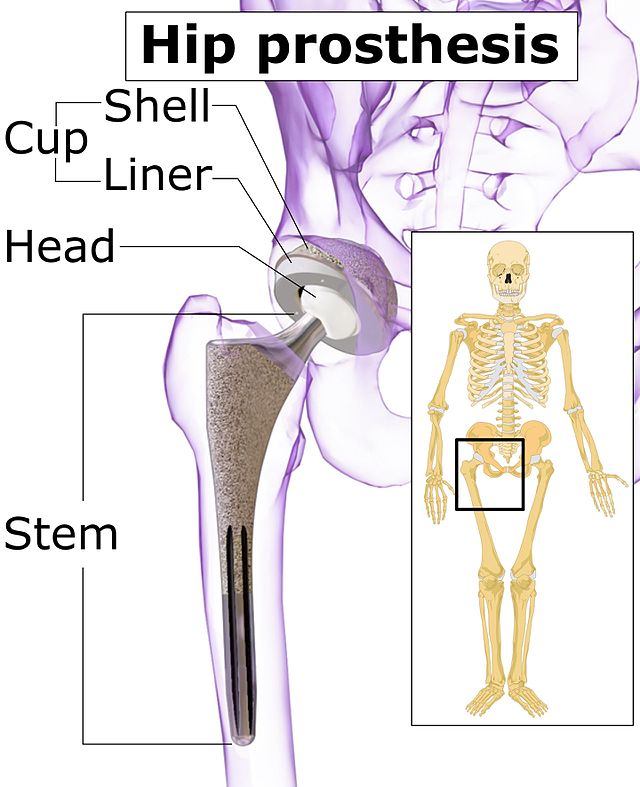Hip replacement surgery is a standard procedure used to treat patients who suffer from joint pain, stiffness, or inflammation in the hip joint. Or perhaps a fractured hip from a fall. It involves removing damaged bone and cartilage from the hip joint and replacing it with a prosthetic implant.
Although hip replacement surgery is generally considered safe and effective, it is not without risk. Sometimes, hip replacement surgery can go wrong, particularly when a doctor or other healthcare professional has been negligent in the patient’s care.
This blog post will discuss determining whether or not your hip replacement has gone wrong by considering the symptoms and problems associated with a failed hip replacement surgery and how you can file a medical malpractice claim in Pennsylvania for botched hip replacement.
Common Problems Associated with Hip Replacement Surgery
Several complications can arise after you’ve undergone hip replacement surgery, including:
- Infection: Surgery infection is a serious complication of hip replacement surgery. While infections are relatively rare, they can occur during or after the surgery. Signs of infection can include fever, pain, swelling, and redness around the surgical site.
- Blood Clots: Blood clots can form in the legs or lungs following hip replacement surgery and can be life-threatening. To minimize the risk of blood clots, doctors often recommend blood thinners and encourage patients to move around as soon as possible after surgery.
- Dislocation: The prosthetic components of a hip replacement can become dislocated if the muscles and ligaments around the hip joint are not strong enough to hold them in place. To minimize the risk of dislocation, patients are advised to avoid certain positions, such as crossing their legs, and to follow a specific rehabilitation program.
- Loosening: Over time, the prosthetic components can loosen from the bone, leading to pain and instability. Loosening can occur due to various factors, including wear and tear, infection, and poor bone quality. Revision surgery may be necessary to replace the loosened components.
- Nerve Damage: Nerve damage may occur due to surgical trauma or stretching during the procedure, resulting in numbness, tingling, or weakness in the leg.
- Osteolysis: Osteolysis is a condition that occurs when the body’s immune system attacks the prosthetic components used in hip replacement surgery, causing the bone around the implant to break down, which can lead to the loosening of the prosthetic components and the need for revision surgery.
Symptoms Of A Failed Hip Replacement Surgery
If you have had a hip replacement surgery and are experiencing pain, stiffness, or other symptoms, it may be a sign of a failed hip replacement surgery. The symptoms of a failed hip replacement surgery can vary, depending on the cause of the failure.
Common symptoms of a failed hip replacement surgery include:
- Pain in the hip, thigh, or groin
- Swelling or inflammation in the hip area
- A limp or difficulty walking
- Dislocation of the implant
- Instability or looseness of the implant
- Leg length discrepancy
- A popping or clicking sound in the hip joint
- Numbness or tingling in the hip, leg, or foot
If you are experiencing any of these symptoms, seeing your doctor as soon as possible is essential. Your doctor may recommend additional tests, such as X-rays, MRI scans, or blood tests, to determine the cause of your symptoms.

Image from Mikael Häggström using source image by BruceBlaus via CC BY-SA 4.0 license
Can You Sue for a Bad Hip Replacement?
If you have suffered from a failed hip replacement surgery due to medical malpractice, you may be able to sue for damages.
The damages that you can sue for in a hip replacement malpractice suit can include the following:
- Medical expenses
- Lost wages
- Pain and suffering
- Loss of enjoyment of life
To succeed in a hip replacement malpractice claim, you must prove that the healthcare provider who performed the surgery did not meet the expected standard of care. That means you will need to show that the healthcare provider made a mistake or acted negligently during surgery or post-operative care. You will also need to show that the error or negligence caused your injury or the failure of the hip replacement surgery.
Hiring a Pennsylvania Hip Replacement Medical Malpractice Attorney
Hip replacement surgery is a standard procedure used to treat patients who suffer from joint pain, stiffness, or inflammation in the hip joint. While hip replacement surgery is generally safe and effective, it is not without risks, and sometimes the surgery may fail.
If you or a loved one has suffered from a failed hip replacement surgery due to medical malpractice, you may be able to sue for damages, but, to be successful, you must work with an experienced medical malpractice attorney who specializes in hip replacement malpractice cases.
The personal injury and medical malpractice experts at Thistle Law can fight for the compensation you and your family deserve following a botched hip replacement surgery. We will investigate your case, gather evidence, and determine if a PA surgical malpractice lawyer is for your claim is appropriate.
Set up a consultation today with one of our helpful Pennsylvania hip replacement malpractice lawyers specialists by clicking here or calling 215-525-6824.

